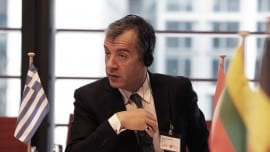«The day after the elections, I had a talk with Alexis Tsipras. I told him – This is a chance for you. I suggested that he should appoint people from the wider centre-left. I didn’t mean people from our party (the Potami party). I was not talking about MPs either. I was talking about eminent personalities, people experienced in Public Administration. I suggested that he should create a government beyond any political borders. This is the kind of government that our country needs. A government of wide coalitions. I would tell Mr Tsipras to do the same thing right now, if he thinks that the current government is weak». This is how Stavros Theodorakis replied, when asked about what Potami suggests, when it comes to the issue of the governance of the country, in this critical moment.
The leader of Potami was hosted in STAR Channel, in the TV show “Ston Eniko”. He answered every single question by the host journalist Nikos Hatzinikolaou , as well as to the citizens attending and participating in the show.
You may find some parts of the interview below:
Asked whether he would participate in a wider coalition government:
I have already said that I am not going to become a Minister. Just for one single reason. I want to prove that one can join politics, without aspiring to become a minister. Because very often, when entering politics, people get obsessed with the idea of becoming Ministers. “Minister, Minister, Minister”. So, this is what I am saying. I do not want to become a Minister. I do not want to become Vice-President of this government or any other government. But, I am pointing out that if this government wants to lead the country out of the crisis’ dead-end, it should be a government representing wider political forces, wider than the ones currently represented in this one.
Asked about who would be the Prime Minister in a wider coalition government:
Mr Tsipras should be the Prime Minister of a wider coalition government. Any other scenario is simply a "coup d’état". “The country does have a Prime Minister. I am just wondering if it has a government”.
Asked to comment on the cooperation scenarios with New Democracy and PASOK:
We are not the same as New Democracy or PASOK. Every political party has, at some point, asked us to join them, but we have decided to follow an independent path. Actually, we decided to enter politics, because we thought that Mr Samaras and Mr Venizelos had messed up. Potami will not co-exist with New Democracy or PASOK within the same political party or the same political front. There is no European front, unless Mr Tsipras is part of it. If we all want to co-exist, along with Mr Tsipras of course, in a common European front, then we too are in”.
Asked to comment on the Independent Greeks (ANEL) and Mr Kammenos:
They all claim to belong to the patriotic center, but everyone has their own past. We are well aware of what Mr Kammenos has been supporting in every level, in social politics, human relations and so on. Mr Kammenos has been expressing, in every instance, nationalistic, racist and in many cases far-right views. Europe opposes these views. I delivered a speech before the Socialists in the European Parliament. I talked to them about the bail-out program and the austerity, in a very harsh way. I told them that they have turned Greece into a well-shaped corpse. But, at the same time, there was a hail of criticism coming from them, who considered unacceptable the fact that such a country, with a left-wing government formed a coalition government with a far-right partner. It is not us pointing out these issues. It is Mr Tsipras’ friends themselves, and he needs to give an explanation about this. I do not know Mr Kammenos. We have never been introduced, we have never talked to each other, we never shook hands. There is nothing personal here. But, I am saying that Mr Kammenos practices are dangerous for Greece.
Asked to comment on the Grexit scenario:
“Euro at any cost, because any other way will lead us to hell. The government is supposed to explain what a possible Grexit would mean for Greeks, since so many of its party members lean towards the drachma option. Potami does not hesitate to state that the drachma environment is the road to hell.
Asked to comment on the government performance so far:
Every single decision they have made at the internal level, opposes to the will of society. You have certainly checked the recent polls. All citizens are upset and displeased with the decisions that have been made, mostly with clientelism. One of the saddest facts about this government, which has not been adequately presented in Greek media, is the appointment of 13 Regional Directors of Education. The government appointed 13 Regional Directors of Education, one in each administrative district. So, this is what we did. We decided to google their names. Googling the first name, we realized that he was a SYRIZA MP candidate. Googling the second name, we realized that it was a local SYRIZA party member, a member of the party in this particular region of Greece. So, what we discovered was that out of the thirteen Regional Directors of Education, eleven were actually party members. We are not sure what the affiliation of the 12th director is, while the last one was a party member of the Independent Greeks party (ANEL). And, on top of that, the ANEL member was appointed in the sensitive region of Thrace, an area that demands particular attention and sangfroid.
Asked to comment on the fact that the government calls the opposition forces “internal Troika”:
This is the construct of SYRIZA “spin doctors”. They are unable to deal with the transparent positions of the Potami party, which submits very specific proposals in the Parliament in every single topic.
Asked to comment on the Greek isolation in the EU:
The government should apologize for the fact that no country is on our side anymore. How have we managed to isolate ourselves? Social media users now pull our leg, because we even lost Cyprus’ “Eurovision song contest 12 points”. We cannot win any national battle, if we are isolated. We have made serious mistakes in our relations with the rest of the EU. If we remain alone, we will stay alone until the end.
Asked to comment on the media, politics and banks relations:
It is time that the sinful triangle of media, politics and banks ended. We said that our priority is not to revive the ERT, the Greek National Broadcaster, unless the sinful landscape of private TV channels gets fixed. The government does not wish to definitely tackle the private channels legal status, so that it can keep channels as hostages. We challenge the government to table a comprehensive law regulating the media. Of course, the government will not do so, as it prefers the perpetuation of the current situation through Ministerial Decrees.
Asked to comment on whether Potami has been excessively promoted by media:
You can take Sunday’s newspapers and judge by yourself whether this is true or not. TV channels have been presenting us much less than we are supposed to be presented based on our electoral performance. Based on data released by the National Council for Radio and Television, Potami is sub-represented in the media, as it recorded just 2% of news broadcast time, while the leader of the party recorded only 5% share of airtime given to the political leaders. This means that Potami is not presented as much as some people think or claim.
Asked to comment on negotiations with the creditors:
Mr Tsipras should tell the Greek people what are the demands of our European creditors. The government was not prepared to negotiate and Mr Tsipras actually admitted it, saying that mistakes are human. No, they are not in this case. We had pointed them out in advance, but Tsipras did not listen to us. The day after the elections, we said that we would support the government in negotiations and we did so. We supported negotiations. But, what does hard negotiation mean? Does it mean having no plan, not realizing the problems of the country, changing the negotiating team every other week? Being serious is the only answer; Being able to say that we proceed with specific reforms and, at the same time, that we have specific demands. Mr Tsipras could have proceeded with a list of specific reforms from the very beginning. He did not do so, because he constantly consults his party’s factions and groups. He is afraid that these groups and factions will feel offended if he refers to the issue of privatizations. Leaders of political parties, when they assume power, are supposed to act for the society rather than their party and its factions.
Asked to comment on the pre-electoral rhetoric of SYRIZA:
In the pre-electoral period, Potami responsibly stated that some pending issues should be addressed first, and subsequently proceed with the elections. SYRIZA on the other hand was insisting on snap elections, claiming that it had the magical solution. A hundred days later, Mr Tsipras admits that there is no magical solution. We already knew, right from the beginning, that there is no magical solution. We knew it, although we were not "professional politicians”. We knew, right from the start, that Mr Tsipras would not be able to raise the minimum salary, as he had promised the day after the elections. Nevertheless, Mr Skourletis, Minister of Labour, announced the day after their victory that the government would raise the minimum salary “as of Monday”. We had denounced these lies in the pre-electoral period. Therefore, SYRIZA and Mr Tsipras personally cannot pretend that they did not know. Also, the ENFIA tax, a property tax, was supposed to be abolished the day after the elections. All these promises were supposed to be kept for the day after the elections. SYRIZA had the magical wand approach before the elections and now that they realize that their approach was elusive, they are just asking for some extra time to keep these empty promises.
Asked to comment on the red lines that Potami would be posing:
The ultimate red line would be the growth of the Greek Economy. If there is no growth, then the whole debate on salaries and pensions leads to nowhere.
Asked to comment on the missed chance of the government:
I think that the government did miss a huge chance. I will tell you one thing that many citizens may not know. Europe wanted the victory of Alexis Tsipras, because they were tired of Samaras and Venizelos. There were talks about corruption and special interests. So, Europe wanted Greeks to vote for a new leader. We could say that Mr Tsipras had an entire stadium waiting for him. He could have entered the playing field and played a good match with his fellow players. Instead, he preferred to violate the rules of the game. There were fouls, extra time and not even one good attack. He missed the chance and did not do what he could have done.
Commenting on privatisations:
We say no to the sale of the high voltage network. We say no to the privatization of water. But, this does not mean that we are allergic to privatizations. If the government suspects that there is a scandal behind a privatization project, then it should intervene and prevent it from happening. And if there is a better offer for a tender, then the government should go for it.
Commenting on the ones who have transferred their money abroad:
Keeping your money in the Greek banks is a duty towards your country, especially when you are a Minister or MP. But, duties towards your country, a patriotic obligation, should not be defined in terms of history, with regard to 19th century heroes like Kolokotronis and Karaiskakis. This is a very smart trick. What are we supposed to do as real patriots for our country nowadays? This should be the question about the definition of our duties. We should take the risk that unemployed people and pensioners have taken. The same risk of those who trusted Greek banks by keeping their money in the Greek banking system.
On the European perspective of the country:
I think that Greece has no future outside the European Union. If we move one step back from the European Union, we will find ourselves in uncharted waters. Greece should focus on one target. To be the leader of the Balkan peninsula, the European Balkan leader. While Greece was once acknowledged as the Balkan superpower, right now it is losing ground, with its economy and society constantly weakening.
4 May 2015
Photo credit: Theodore Manolopoulos






